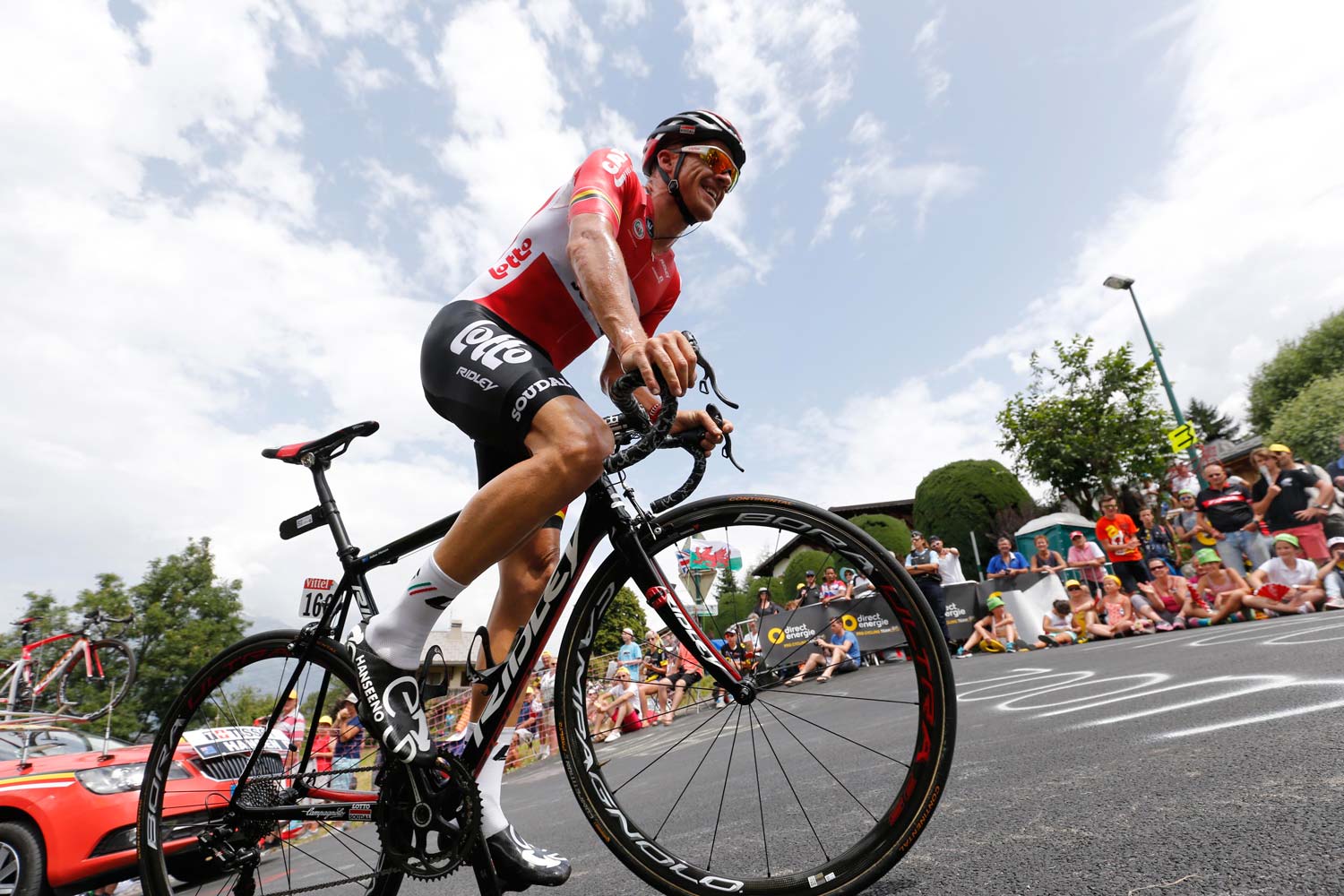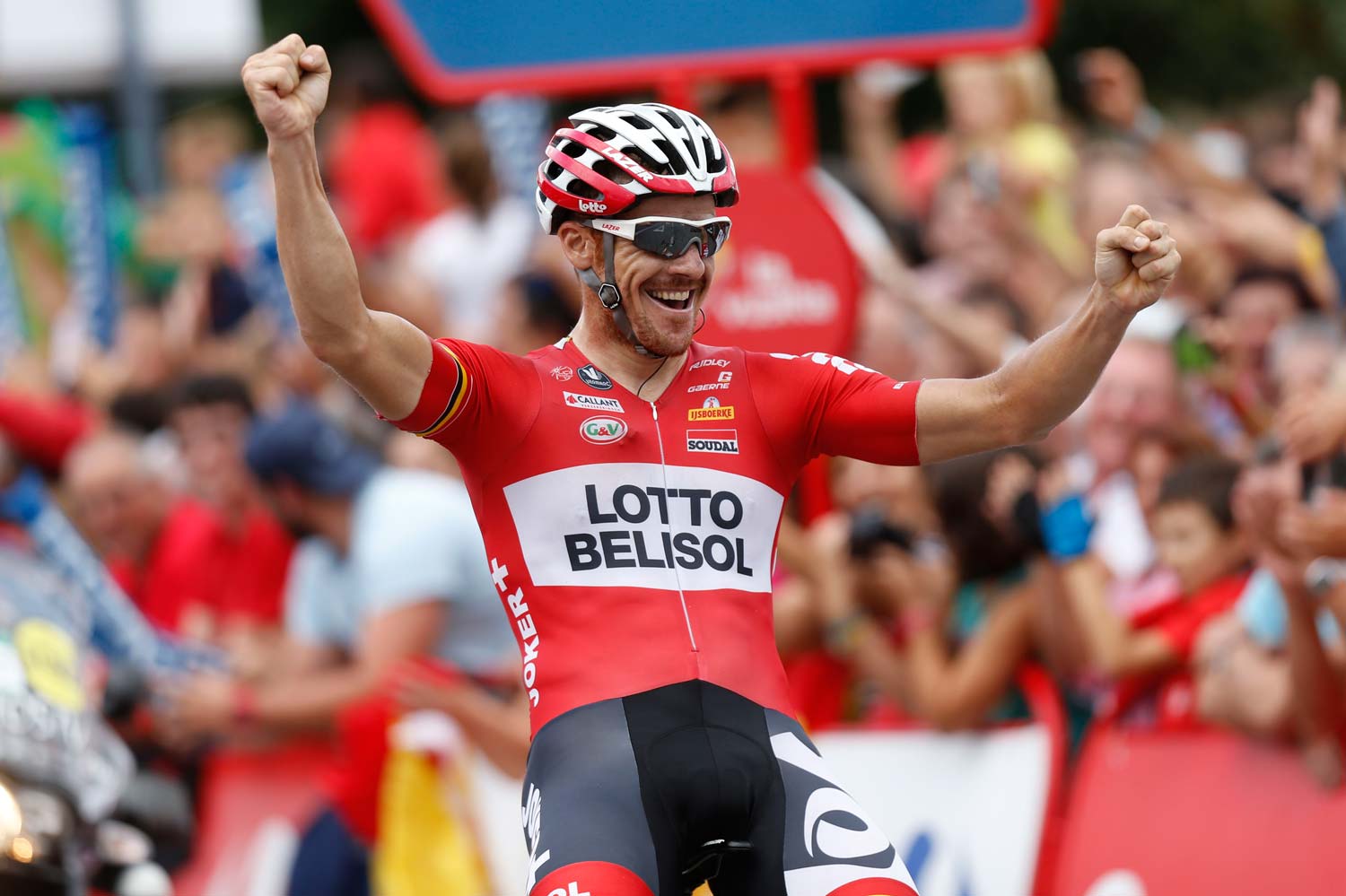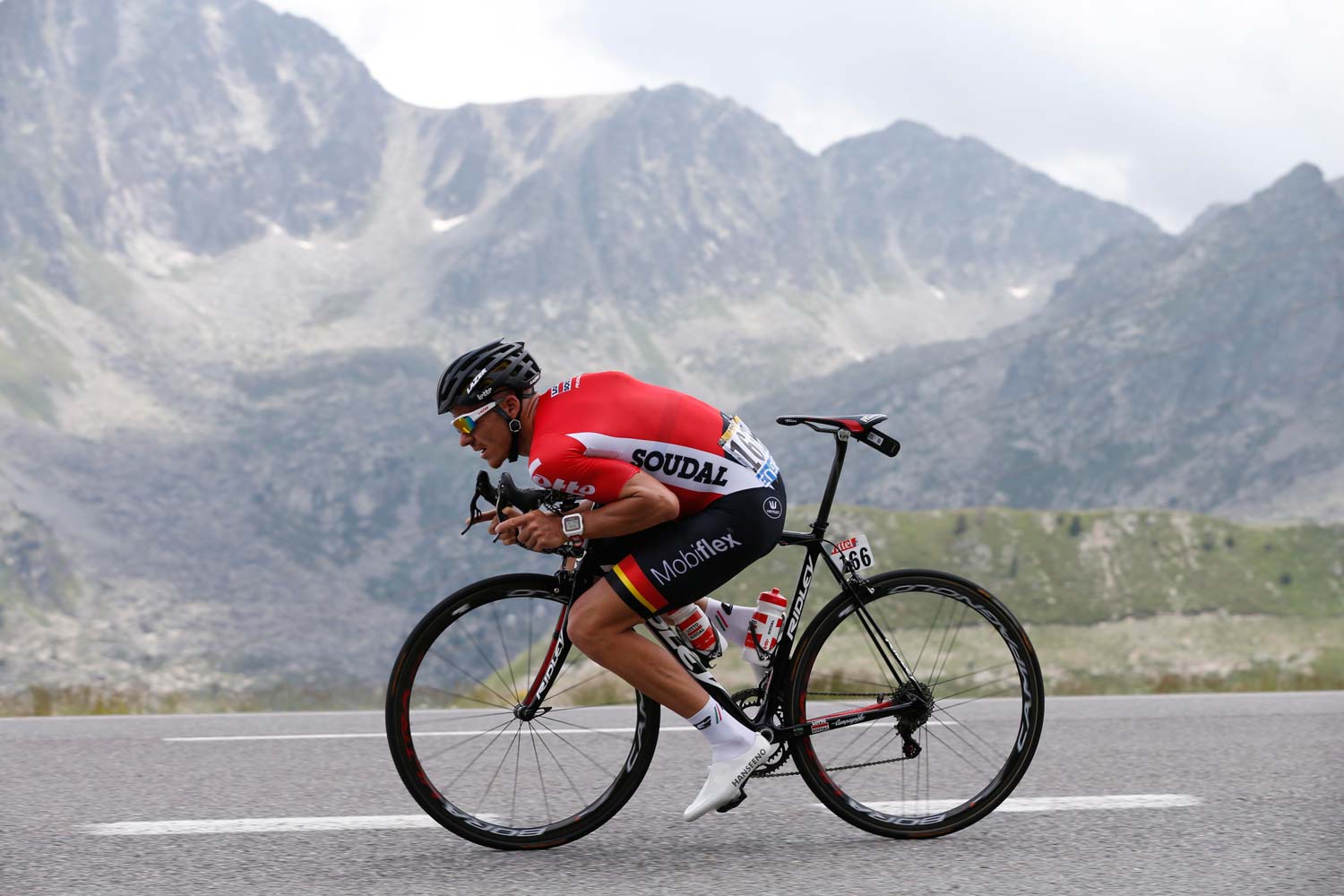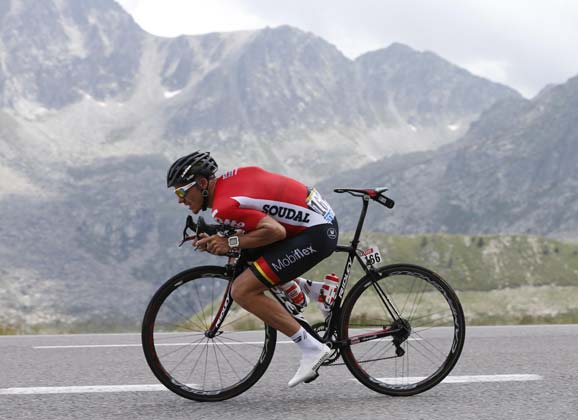The third Grand Tour of 2016 begins tomorrow. Seems to have rolled around pretty quickly, don’t you think? It tends to sneak up a little faster in an Olympic year. One day it’s the end of the Tour, a blink of the eyes and the road race is on in Rio, and suddenly, here’s the Vuelta a España.
It gets underway with a 27.8km team time trial just to the north of Portugal and the route then traces a path from west to east along the northern side of Spain before dipping south in advance of the finish in Madrid three weeks from now.

Adam Hansen in the 18th stage of the 2016 Tour de France, his 15th successive Grand Tour.
This August he lines up for the Vuelta a España and continues adding to his record tally of Grand Tour starts.
Photo: Yuzuru Sunada
The team presentation has come and gone and although the Vuelta’s official site is yet to post the official start list, it’s now available on CyclingNews.
There are 22 teams of nine riders, including seven Australians (in alphabetical order): Simon Clarke (CDT), Simon Gerrans (OBE), Nathan Haas (DDD), Jack Haig (OBE), Adam Hansen (LTS), Damien Howson (OBE) and Rory Sutherland (MOV).
Yep, there’s that name again: Hansen.
The tradition continues. Another Grand Tour, another three weeks on the road for Adam Hansen. This will be his 16th successive Grand Tour!
Giro, Tour, Vuelta… Giro, Tour, Vuelta… Giro, Tour, Vuelta… so it’s been for five years, and counting. Nine weeks per year at these bike races.
He’s done more Grand Tours than this, but he’s finished 15 in a row and is about to embark on his 16th in succession so we took a moment to chat to him last night and find out what he’s been doing since the Tour, what he gets out of his racing, and a few other little quirks from a rider who is always engaging.
Hansen is part of the Lotto-Soudal team which has a range of strong riders, all of whom are capable of picking up a result. The line-up of the Belgian-registered squad for the next three weeks is (in dossard order):
Bart De Clercq (BEL), Sander Armée (BEL), Thomas De Gendt (BEL), Gert Dockx (BEL), Adam Hansen (AUS), Maxime Monfort (BEL), Tosh van der Sande (BEL), Louis Vervaeke (BEL) and Jelle Wallays (BEL).
One Aussie who lives in the Czech Republic amidst a collective of Belgians… and he’s at home on this roster and happy to be part of the action for the adventure that will eventually lead him to Madrid on 11 September.
* * * * *
Click the SoundCloud file to listen to the interview with Adam Hansen and/or read the transcript below…
* * * * *
RIDE: It’s about a day until the Vuelta of 2016 begins and I’m talking with one of the usual suspects for a start in a Grand Tour, Adam Hansen. Good to have you on the phone…
Adam Hansen: “Likewise, talking to you also.”
Is this going through the motions or does it feel like another exciting race for you?
“Oh, it’s another exciting race. I really like the Vuelta, it’s one of my top favourite GTs of the year. We’ve got a good team here and it’s a lot more relaxed, especially coming after the Tour [de France]. It’s very nice to be here.”
And what are the expectations? What’s the team riding for? We sort of understand the Tour but the Vuelta is a bit of a lottery, isn’t it?
“Yeah it is, it’s like that. We haven’t had the team meeting yet, that’s happening tomorrow [Friday 19 August, the eve of the race]. But just looking at the field here we’ve got Tosh, who should be able to get [something]… he’s always very close to getting stage wins in sprints and we hope he can get something.
“And we have Bart De Clercq and Maxime Monfort which is good for GC because they usually run top-15s, top-10s… and we’ll see what they can do.
“Then we have Thomas De Gendt who won the Mont Ventoux stage in the Tour, so hopefully he’ll be in the same form like at the Tour and can show his magic in the Vuelta.”

Hansen won the 19th stage of the 2014 Vuelta a España. His hope is to claim another victory for himself at the Spanish Grand Tour this year…
Photo: Yuzuru Sunada
It seems strange in an Olympic year because there’s that broader sporting context that seems to sort of take over the narrative of the season. In Australia the time zones are never really [ideal] so I think a lot of people who care about the Olympics are ‘jet lagged’, but then a lot of people seemed to have tuned out. What’s it like in Spain for you at the moment?
“You mean in regards to the Olympics or the Vuelta?”
Well, I guess, in regards to the commentary of the cycling season… normally, without the Olympics, there’d be more hype about the Vuelta but it’s almost upon us and we’re now starting to talk about it in the cycling press. Does it feel that way amongst the riders?
“Ah, not really. The Olympics, from a riders’ point of view, is not the biggest race in the world. And it’s not even the second or the third or fourth biggest race in the world.
“I think from a cyclist’s point of view it’s an amazing thing. It would be an amazing thing to go to the Olympics because of the experience and to say you’ve done it, but as a cyclist it’s just another race on the calendar.
“I know that sounds a bit sad towards the Olympics but cycling has got such a huge culture in other races and a lot of these are also very important and the riders coming to the Vuelta, you know, we want to be here just as much.
“To us it seems like it’s another year, another Vuelta and not much has changed.”
That’s interesting. For me as a fan of track cycling I try to get a buzz about the Olympics and I guess I took my focus away from road cycling [during the time of the Games]. What’s happened for you between the Tour and the Vuelta? I know that you like to stop very definitively after a Grand Tour; did you do that between the Tour de France and the Vuelta?
“Oh, for sure. I didn’t do much cycling related things outside of training.
“I trained but I didn’t really watch the Olympics. The only thing I saw at the Olympics was the last 10km of the women’s [road] race and only because I was at a friend’s house and it was on TV.
“I don’t really watch TV. Actually, I don’t even own a TV at home.
“Then I read the report on the road race of the men, so I missed that also.
“For me it’s a bit different, I guess. You’re probably asking the wrong person these questions.”

Hansen and Simon Clarke are two of the seven Australians who will start the Vuelta in 2016.
Photo: Yuzuru Sunada
Let’s talk about what you did do. Like, how do you keep fresh between Grand Tours? You’ve done one after the other after the other… this is the 16th, isn’t it?
“Yeah, 16.
“I’ve had my family with me. My sister and my mother stayed with me the whole time, until five days before coming here [the province of Ourense, where the Vuelta starts in 2016] so I was busy with that. And then I had some friends come from Dubai and visit me. That was pretty exciting.
“I’ve got my work commitments [computer programming] which I was actually busy with, and my training.
“I’ve done less training this year than last year. I wanted to be a bit more fresher here. I want to try a different approach for this year’s Vuelta, just to be a little bit more underdone – and hopefully I can shine a lot better and be stronger in the second and third week.”
So you’re deliberately coming in ‘underdone’, does that mean that you have a curiosity of how the body is going to function or are you pretty aware of how the legs will go?
“Ah, I know I’m going to be very good in the third week.
“I think I’ll struggle, maybe, in the first few days. And it’s not going to help with the team time trial, the first [stage] to start with. But three weeks is a long time to race and it’s a long time to be good every single day.
“I hope that I’ve come to the Vuelta with very good preparation from the racing I’ve done at the start of the year and to be one of the freshest riders here, with such a good base. I hope that can play a good role for me in the final week and I can do something for myself.
“I am curious to see how it pans out but I believe it will work out in a good way.”

The winner of the People’s Choice vote at the 2015 Australian Cyclist of the Year Awards is a rider who never stops trying new things.
Hansen has a new approach to the Vuelta in 2016 and he’s hoping his “underdone” approach will serve him well.
Photo: Yuzuru Sunada
The concept of Grand Tours, one after the other, has been well discussed and documented with you. Do you play different games though – that might not be public – about each race? Is there some sort of personal objective that you set yourself?
“If you’re talking about during the race, I always… well, in the Tour it’s more for the team and helping the team get the results.
“The Giro and the Vuelta are more like a wildcard and I can do things for myself.
“Okay, at the Giro this year we had André [Greipel] and then we lost him [DNS, stage 13] and there weren’t that many opportunities for a breakaway.
“The Vuelta looks a lot better for breakaways this year compared to the other two Grand Tours. So, for myself, I’d really like to get in as many breakaways as possible and have as many chances as possible.
“In the Tour I focussed solely on one or two stages for myself and my fault there was: those two days didn’t work out and because I didn’t give the other stages a chance then I really cut myself short there.
“At the Vuelta, I want to take my chances. I really want to be as active as possible even on the day when I think there’s a one percent chance, I’ll try and be in the break just to have that one percent chance. I want to give it everything and, like I said, I’m very fresh coming into the Vuelta so hopefully I can go a lot harder than other riders.
“With an Olympic year, like you said before, some riders don’t want to come here when there’s an Olympics on. Or you have riders doing other races so [some] have generally raced a lot more before coming to the Vuelta; I think I may have an advantage by being a bit more fresh. I hope my theory works well in practice.”
So it’s a curious time for the team. It’s going to be interesting to see who peaks and who is just rolling to the finish. I guess it’s a little bit more of a magical mystery Tour, isn’t it – the Vuelta?
“Yeah it is. Well, not just for our team but the spectators at the Vuelta, they just love it. They never know who is going to win the Vuelta.
“The Tour is pretty predictable and also the Giro a little bit… not as predictable as the Tour but it’s also a little predictable. But the Vuelta…
“I think last year there was maybe… the [leader’s] jersey was changing hands every two or three days and from a spectator’s point of view it’s such an exciting race to watch. This is what I like about the Vuelta; it’s an unknown.
“You have guys who win stages that normally don’t win stages.
“You never know who is going to win the GC.
“It’s one of the most exciting races to watch from a spectator’s point of view.”
So you’re engaged by it. I know, for example, Mathew Hayman – when he finished his first Tour [this year] he had no idea what was going on really. He knew where he was but he didn’t seem to understand – or care – about GC, for example. When you’re riding, do you get the results sheet at the end of the day and analyse it, like a fan? Or do you just sort of go: ‘Okay, there’s where my team-mates are, this is what I can do next…’ and then you think about the next day?
“I never look at the results actually, even my own results. When I do a Grand Tour, I never know what I do on a stage. It’s just… it’s more: you ask how your top guys in the team go, if it’s GC – ‘How did you go?’
“Or, if it’s a sprint: ‘How did you go, André?’ Obviously, if he wins, you know it beforehand; if he doesn’t, you find out afterwards.
“But the GCs, when they get up the road, [I] try and put them in the best position and [that’s it]. Afterwards, you see how they go.
“It sound terrible, but once a week I might look at the results and see how far Bart De Clercq is off the top 10, for example – something like that. But I just try and continue doing the same job.
“These things are sort of more out of my hand.
“It’s like how Mat Hayman says; there are so many races going on in one Grand Tour that I don’t take part in the GC race so… it’s not that I’m not interested in it but it’s more like, I know who is leading it. I know the guys who are close. But exactly, in the fine details, I don’t know much. Can I make an impact on that? No, not really.
“I just make sure my team does well and then do what’s best for the team and myself.”
I could keep asking questions of you all night because I find it interesting to get your answers; they seem honest and [they] probably will surprise a few people. I think people would just assume that you really want to know what’s going on in the race but clearly you just do your own thing. I wish you all the best, I know that we’ll be paying attention to you and I look forward to hearing how things pan out once you get to Madrid, because we can assume you’ll finish another one.
“Well, I hope so. Touch wood. Touch a lot of wood.
“Thank you.”
– Interview by Rob Arnold



